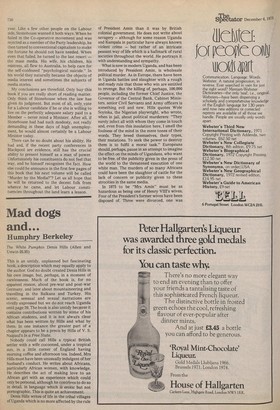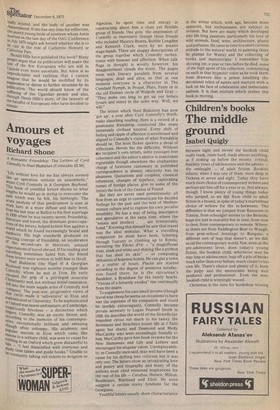Mad dogs and...
Humphry Berkeley
The White Pumpkin Denis Hills (Allen and Unwin £6.95) This is an untidy, unplanned but fascinating book, a description which may equally apply to the author. God no doubt created Denis Hills in his own image, but, perhaps, in a moment of carelessness. Much of the book is, for no apparent reason, about pre-war and post-war Germany, and later about mountaineering and travelling in the Balkans and Turkey. His scenic, sensual and sexual narrations are vividly expressed but we do not reach Uganda until page 59. The book is also untidy because it contains contributions written by some of his African students, and it is not always clear what has been written by Hills and what by them. In one instance the greater part of a chapter appears to be a precis by Hills of V. S. Naipaul's In a Free State.
Nobody could call Hills a typical British settler with a wife cocooned, under a tropical sun, in a little corner of England having morning coffee and afternoon tea. Indeed, Mrs Hills must have been unusually indulgent of her husband's conduct. He writes about Africans, particularly African women, with knowledge. He describes the act of making love to an African girl with an experience which could only be personal, although he contrives to do so in detail, in language which is erotic but not pornographic. This is quite an achievement.
Denis Hills writes of life in the tribal villages of Uganda which is no more affected by the rule of President Amin than it was by British colonial government. He does not write about savagery — although for some reason Uganda and Kampala in particular have always known violent crime — but rather of an intricate peasant way of life which is a hallmark of rural societies throughout the world. He portrays it with understanding and sympathy.
What is new in modern Uganda, and has been introduced by President Amin, is wholesale political murder. As in Europe, there have been in Uganda battles and slaughter with a rough and ready rule that those who win are entitled to revenge. But the killing of, perhaps, 100,000 people, including the former Chief Justice, the Governor of the Central Bank, Cabinet Ministers, senior Civil Servants and Army officers is something evil and new. Hills quotes Wole Soyinka, the Nigerian playwright, who wrote, when in jail, about political murderers: "They surely infect all with whom they come in touch and, even from this insulation here, I smell the foulness of the mind in the mere tones of their words. They breed themselves, their types, their mutations. To seek the power to destroy them is to fulfil a moral task." Europeans should, perhaps, pause in an attempt to imagine the effect on the minds of Ugandans, who want to be free, of the publicity given in the press of the world to the threatened execution of one white man. The murders of so many Africans could have been the slaughter of cattle for the lack of concern or publicity given to these atrocities in the same media.
In 1975 to be "Mrs Amin" must be as hazardous as being one of Henry VIII's wives. Four of the President's former wives have been disposed of. Three were divorced, one was badly injured, and the body of another was
dismembered. If she has any time for reflection, the
Jaunty young bride of nineteen whom Amin married on the last day of the OAU Conference J1) July 1975 might ask herself whether she is to he cast in the role of Catherine Howard or Catherine Parr.
Should Hills have published this book? Many People argue that its publication will make the fate oi the few Europeans who are still in Uganda even more uncertain. But Amin is so Unpredictable and ruthless that I cannot imagine that he would be mollified by its suPPression or driven to further atrocities by its Publication. The world should know of the suffering of the Ugandan people and also, through Denis Hills's story, of the bravery of the handful of Europeans who have decided to remain.


































 Previous page
Previous page